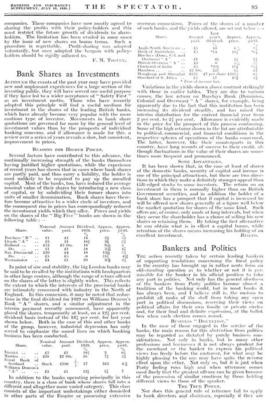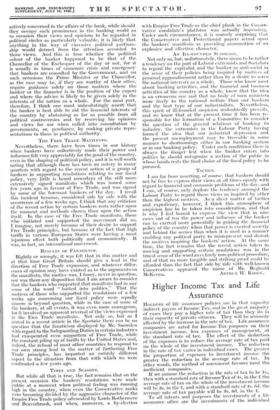Bankers and Politics
THE action recently taken by certain leading bankers of supporting resolutions concerning the fiscal policy in the country has brought up in rather acute form an old-standing question as to whether or not it is per- missible for the banker in his official position to take any part in politics. Not only has the general aloofness of the bankers from Party politics become almost a tradition of the banking world, but in most banks it has always been, and 1 believe still is, the custom to prohibit all ranks of the staff from taking any open part in political discussions, reserving their views on political affairs for their own family or private circles and, for their final and definite expression, at the ballot box when each election conies round.
BUSINESS " DISCRETION."
In the ease of those engaged in the service of the banks, the main reason for this abstention from polities may be regarded as dictated by purely business con- siderations. Not only in banks, but in many other professions and businesses -it is not always prudent for the merchant or the banker to express his political views too freely before the customer, for what may be highly pleasing to the one may have quite the reverse effect upon the other. Not only so, but it is just when Party feeling runs high and when utterance conies most freely that the greatest offence can be given because of the possession of similar emotions by those holding different views to those of the speaker.
THE TRUE POWER.
Nor does this general rUle of reticence fail to apply to bank directors and chairman, especially if they are
actively concerned in the affairs of the bank, while should they occupy such prominence in the banking world as to occasion their views and opinions to be regarded in political circles as particularly valuable, it is likely that anything in the way of excessive political partisan- ship would detract from the attention accorded to those views. And this is true whether the political colour of the banker happened to be that of the Chancellor of the Exchequer of the day or not, for it is usually in times of economic crisis and emergency that bankers are consulted by the Government, and on such occasions the Prime Minister or the Chancellor, as the case may be, if they are worthy of their office, require guidance solely on those matters where the banker or the financier is in the position of the expert and where the .advice is likely to be given solely in the interests of the nation as a whole. For the most part, therefore, I think one must unhesitatingly assert that the banker is best able to aid the financial interests of the country by abstaining as far as possible from all political controversies and by reserving his opinions and views for use when called into consultation by governments, or, perchance, by making private repre- sentations to those in political authority.
THE FREE TRADE: MANIFESTO.
Nevertheless, there have been times in our history when bankers have collectively made their power and influence felt very appreciably for the good of the country. even in the shaping of political policy, and it is well worth noting that although there has been an outcry in many quarters with regard to the recent action of a group of bankers in supporting resolutions relating to our fiscal policy, very little is heard nowadays of the still more extensively signed manifesto which was issued some few years ago in favour of Free Trade, and was signed by some of the foremost bankers of the day. I recall this incident because, considered side by side with the occurrence of a few weeks ago, I think that any criticism of the recent action by certain bankers rests rather upon the moment and methods chosen than upon the action itself. In the case of the Free Trade manifesto, those who initiated and supported the movement did so, I imagine, not merely because of their desire to support Free Trade principles, but because of the fact that high tariffs in various European States were having a most injurious effect both politically and economically. It was, in fact, an international movement.
RESULTS OF FANATICISM.
Rightly or wrongly, it was felt that in this matter and at that time Great Britain should give a lead in the direction of Free Trade expansion, and whatever differ- ences of opinion may have existed as to the arguments on the manifesto, the motive was, I fancy, never in question, nor was there any disposition that I am aware to consider that the bankers who supported that manifesto had in any sense of the word " butted into politics." That the motives of those wha supported the resolutions of a few weeks ago concerning our fiscal policy were equally sincere is beyond question, while in the case of some of the bankers, at all events, it was even more courageous, for it involved an apparent reversal of the views expressed in the Free Trade manifesto. Not only so, but as I stated in a recent article in the Spectator there can be no question that the fanaticism displayed by Mr. Snowden with regard to the Safeguarding Duties in certain industries had exasperated even supporters of Free Trade, while the constant piling up of tariffs by the United States and,. indeed, the refusal of most other countries to respond to our own strong lead in the matter of furthering Free Trade principles, has imparted an entirely different; aspect to the situation from that with which we were confronted a few years ago.
TIMES AND SEASONS.
But while all that is true, the fact remains that on the present occasion the hankers' resolutions were made public at a moment when political feeling was running' high in the country, when even the Conservative ranks. were becoming divided by the aggressive character of the Empire Free Trade policy advocated by Lords Rothermere and Bcavcrbrook, and when, moreover, a by-election with Empire Free Trade as the chief plank in the Conser- vative candidate's platform was actually impending. Under such circumstances, it is scarcely surprising that the Conservative and Protectionist papers seized upon the bankers' manifesto as providing ammunition of an explosive and effective character.
AN ILL-FOUNDED SUSPICION.
Not only so, but, unfortunately, there seems to be rather a tendency on the part of Labour extremists and Socialists to regard the capitalist and the banker as anti-social in the sense of their policies being inspired by motives of personal aggrandisement rather than by a desire to serve the national interests as a whole. Those who know most about banking activities, and the financial and business activities of the country as a whole, know that the idea is an erroneous one and that no body of men ministers more freely to the national welfare than our bankers and the best type of our industrialists. Nevertheless, this spirit of ill-founded suspicion undoubtedly prevails, and we know that at the present time it has been re- sponsible for the formation of a Committee to consider, the question of the general relations of banking to industry, the extremists in the Labour Party having formed the idea that our industrial depression and the present unemployment may be traceable in some manner to shortcomings either in our banking system or in our banking policy. Under such conditions there is always the danger lest when the banker enters into politics he should antagonize a section of the public in whose hands rests the final choice of the fiscal policy to be pursued. TACTICS.
I am far from asserting, of course, that bankers should.
not be free to express their views at all times openly with regard to financial and economic problems of the day, and I can, of course, only deplore the tendency amongst the Labour Party to regard those views as inspired by other than the highest motives. As a sheer matter of tactics and expediency, however, I think this atmosphere of suspicion has to be taken into consideration, and that is why I feel bound to express the view that in nine cases out of ten the power and influence of the banker can be exerted more powerfully in guiding the financial policy of the country when that power is exerted secretly and behind the scenes than when it is used in a manner enabling any political party to misrepresent and distort the motives inspiring the bankers' action. At the sonic time, the fact remains that the recent action taken in moving and supporting certain resolutions was in the truest sense of the word an entirely non-political procedure, and of that no more tangible and striking proof could lie afforded than the fact that side by side with well-known Conservatives appeared the name of Mr. Reginald

















































 Previous page
Previous page